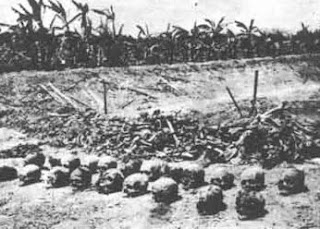The Genocide of the Bangladesh-Pakistan War: A Painful Chapter in History
The Bangladesh-Pakistan War of 1971 stands as one of the darkest periods in the history of South Asia, marked by widespread atrocities, mass killings, and a systematic campaign of genocide. Lasting for nine months, the conflict resulted in the birth of Bangladesh as an independent nation but left behind a legacy of suffering and trauma that continues to haunt the collective memory of the region.
### Historical Context
The seeds of the Bangladesh-Pakistan War were sown in the complex political landscape of pre-independence South Asia. Following the partition of British India in 1947, the region was divided into two separate nations: India and Pakistan. However, within Pakistan, stark cultural, linguistic, and economic disparities existed between its eastern and western wings, separated by over a thousand miles of Indian territory.
The people of East Pakistan (present-day Bangladesh) felt marginalized and oppressed by the central government in West Pakistan (present-day Pakistan). Grievances over political representation, economic exploitation, and cultural suppression escalated over the years, leading to growing demands for autonomy and recognition of Bengali identity.
### The Conflict Unfolds
In March 1971, simmering tensions erupted into violence when the Pakistani military launched a brutal crackdown on the Bengali population in East Pakistan. Codenamed "Operation Searchlight," the military's campaign aimed to suppress dissent and quell the growing calls for independence. However, what followed was not just a suppression of rebellion but a systematic campaign of genocide against the Bengali people.
### Horrors of Genocide
The atrocities committed during the Bangladesh-Pakistan War constitute one of the most egregious examples of genocide in modern history. The Pakistani military, with the support of local collaborators, unleashed a reign of terror characterized by widespread rape, torture, and indiscriminate killings of civilians.
Villages were razed to the ground, families were torn apart, and innocent civilians, including women and children, were subjected to unimaginable brutality. Massacres were carried out with impunity, and countless lives were lost in the name of maintaining control over East Pakistan.
### International Response
As news of the atrocities in East Pakistan reached the international community, outrage and condemnation grew. Reports from journalists, humanitarian organizations, and eyewitness accounts painted a grim picture of the unfolding humanitarian crisis. Despite initial reluctance to intervene due to geopolitical considerations, the global outcry eventually forced world powers to take action.
### Birth of Bangladesh
The turning point in the conflict came with India's intervention in support of the Bangladeshi independence movement. In December 1971, the Indian military launched a full-scale offensive against Pakistani forces, leading to their eventual defeat and the liberation of Bangladesh. On December 16, 1971, Pakistan surrendered, and Bangladesh emerged as an independent nation.
### Remembering the Victims
As we reflect on the genocide of the Bangladesh-Pakistan War, it is essential to remember the countless lives lost and the enduring scars left behind. The survivors of the conflict continue to grapple with the trauma of their experiences, and the memories of their loved ones lost to violence remain etched in their hearts.
### Lessons Learned
The genocide of 1971 serves as a stark reminder of the consequences of unchecked power, intolerance, and oppression. It underscores the importance of upholding human rights, promoting inclusivity, and fostering dialogue to prevent such atrocities from recurring.
### Conclusion
The genocide of the Bangladesh-Pakistan War of 1971 represents a tragic chapter in the history of South Asia—one marked by immense suffering, loss, and resilience. As we commemorate the sacrifices of those who perished, let us also reaffirm our commitment to building a world where justice, peace, and dignity prevail for all. Only by confronting the painful truths of the past can we hope to create a brighter and more compassionate future for generations to come.


Comments
Post a Comment